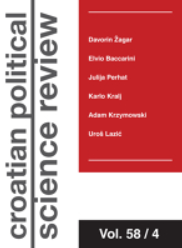INSTITUCIONALNI USTROJ I FORMULACIJA POLITIKE SREDNJEG STRUKOVNOG OBRAZOVANJA U HRVATSKOJ: AKTERI, STRATEGIJE I “PROMJENA KOJA NIŠTA NE MIJENJA”
INSTITUTIONAL FRAMEWORK AND FORMULATION OF THE UPPER SECONDARY VOCATIONAL EDUCATION POLICY IN CROATIA: ACTORS, STRATEGIES AND THE “CHANGE THAT CHANGES NOTHING”
Author(s): Nikola BukovićSubject(s): School education, Vocational Education, State/Government and Education
Published by: Fakultet političkih znanosti u Zagrebu
Keywords: Vocational Education; Framework; Actors; Formulation; Coalitions;
Summary/Abstract: This paper presents an application of the explanatory model aimed at formulation and institutional development in the field of the Croatian upper secondary vocational education. Data was collected via 17 in-depth semi-structured interviews with informants directly involved in formulating relevant policy documents from the independence onwards. Informants were affiliated with competent central state entities, counties, employers’ associations, trade unions and relevant international organizations. The overall thesis that central state actors hold the greatest positional power over key institutional features such as financing, learning content and standards of delivery, is but partially validated. Indeed, central state actors represent the most powerful group. However, dynamics are predominantly structured around workings of two relatively stable and competitive coalitions: “the educational” vs. “the economic”, with the affiliation of central state actors commonly split between these two coalitions.
Journal: Politička Misao
- Issue Year: LVIII/2021
- Issue No: 03
- Page Range: 208-242
- Page Count: 35
- Language: Croatian

